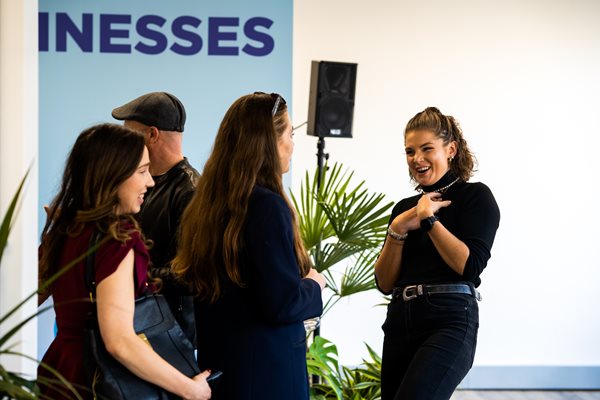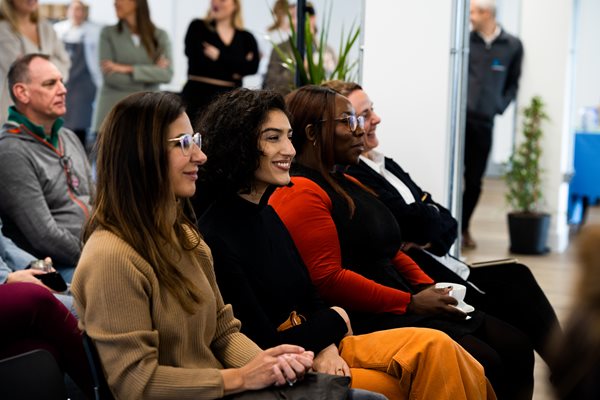
Our 5 Key Takeaways to Support Wellness and Wellbeing in the Workplace
Last week we were lucky enough to host an incredible panel of mental health experts at The Old Dairy in Shoreditch, discussing the importance of wellness and wellbeing in the workplace.
With an audience of Workspace customers, we were joined by mental health ambassador and TV star Dr Alex George, Adam Amaha of puppy therapy start-up Paws In Work, Ally Mahon of fertility and employment resource Bloss, Ocado Group’s global head of health and wellbeing Arti Kashyap-Aynsley and Workspace’s own events manager Stacy Lyden-Sauppe for a fascinating morning of advice, insight and – thanks to Adam – plenty of puppies.
Each of our five panellists was incredibly open and honest about their own experiences, as were the audience during a fascinating Q&A session. For those who weren’t able to attend, here are some ideas to implement in order to help your employees thrive.
Mental Health is for everyone
All of our panellists were keen to explain that mental health affects everyone – even if you’re feeling great right now. “We care about the people we work with,” explained Dr Alex George. “Even if you don’t think it affects you, it’ll affect someone you know.” Ally Mahon added that everybody is unique – meaning strategies needed to help those having mental health issues need to be equally individualised. “Mental health is so complex,” she said, adding that companies need to ask: “How can we support everyone in an organisation when what works for them is so different?” Stacy Lyden-Sauppe agreed that wellbeing also means different things to different people. “It’s about doing whatever makes you feel like the best version of you,” she said, which might be yoga in the morning for some people but simply getting a good night’s sleep for others.
Harness the benefit of being a small business
Many Workspace companies are small and agile, meaning they’re in the best possible position to help your team out when it comes to their mental health. Stacy Lyden-Sauppe opened up about how smaller businesses are able to listen to their workforce and “pivot to change as needed”. Arti Kashyap-Aynsley was keen to shine a light on the “lack of consistency” that sometimes comes with being a bigger business, especially ones that were founded before discussions around mental health had been commonplace.
Lead by example
When it comes to being sensitive around mental health and wellbeing in the workplace, those higher up in the company need to lead by example. This means calling time on what Dr Alex George calls “toxic productivity”. Arti Kashyap-Aynsley says leadership need to set the tone and not work oppressively long days and overstretch themselves. “That tonality has to come from the top,” she explained. “People are going to do what they see, not what you say.” Your team needs to feel safe about bringing up concerns, and won’t find this easy if the culture seems to suggest that overworking should come hand-in-hand with doing their job. Wellbeing shouldn’t be a checkbox exercise, adds Ally Mahon. “Senior leaders need to be buying into it and improving the mental health of the culture,” she says. “Otherwise people don’t feel safe to say they’re struggling.”

Offer wellbeing days
Of course, we can talk all we like about changing the culture, but our panel also discussed actual practical solutions to improve mental health at work. Adam Amaha explained that Paws In Work offer wellbeing days on top of annual leave, as well as giving time off on birthdays. He also suggested looking into people’s actual workload. “Are people working too much?” he asked. “Are people given enough time to do the work they’ve been asked to do?”
Offer choice
Ally Mahon said it’s important for employers to be flexible, which might mean letting people pick their kids up or taking a gym class in the middle of the day. Working from home too should be an option, especially on days when people simply need their own space. “It’s about working how you work best,” added Adam Amaha, who was keen to let his team have autonomy. “Personalisation is huge – you want to be able to feel like you have choice,” agreed Arti Kashyap-Aynsley, who is keen for companies to recognise that mental health is just as important as physical health. “Why separate them?” she asked. “An illness day is an illness day. We need to make it easier for people to wear what they’re feeling on their sleeve”.
